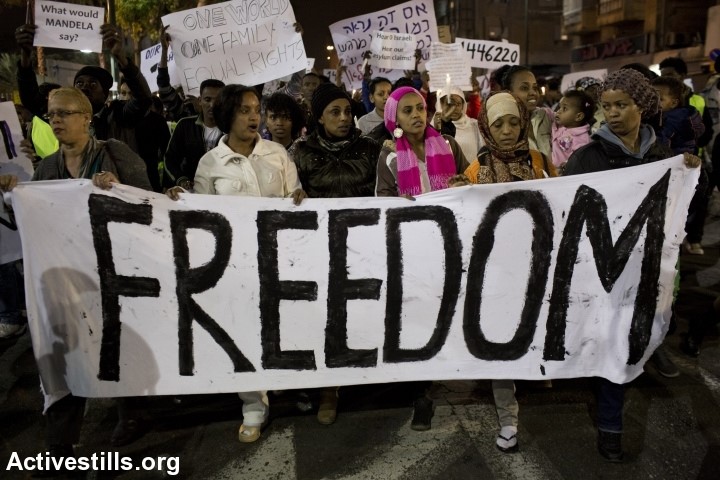The High Court of Justice struck down on Monday amendments to the “Infiltrators Law” – passed by the Knesset in December – and ruled that the Holot detention facility must be closed within 90 days. The majority opinion also struck down the amendment allowing for a year-long detention of asylum seekers. Six justices supported the decision, with one opposing. A majority ruling – by seven justices – nullified the law which regulated the establishment and operation of the Holot detention center, scheduled to be shut down within 90 days.

African asylum seekers march in center Tel Aviv to protest against the Holot detention center located in the south of Israel, and to call the Israeli government to recognize their refugee rights, December 28, 2013 (Photo: Activestills)
An expanded panel of nine High Court justices unanimously ruled in September 2013 that the amendment to the Prevention of Infiltration Law, an amendment that allows the detention of infiltrators for up to three years without trial, is unconstitutional. According to the judges, the arrangement disproportionately harms the constitutional right to freedom set forth in the Basic Law: Human Dignity and Liberty. The amendment to the Infiltration Law was initiated by Prime Minister Benjamin Netanyahu.
Human rights activists have claimed that the new law was an assault on liberty, even after they helped shape the amendments to the previous law. The High Court justices agreed with the activists, rejecting the central sections of the controversial legislation.Human rights groups have insisted that the majority of the African migrants in Israel cannot be deported because of threats to their lives in their homelands of Sudan and Eritrea.
According to MK Dov Khenin (Hadash): “The court ruled today that asylum seekers are human and a so-called ‘open prison’ is still a prison. Now is the time for the policy that we have been long demanding. A mechanism for evaluating asylum requests, distributing of asylum seekers around the country and giving them the right to work and receive social services.” Mutassim Ali, a Sudanese refugee and one of the leaders of the protest movement against the Holot detention center, expressed cautious optimism at the decision. “I am concerned about new measures by the government to harm asylum seekers … but I very much hope that this will be the trigger for a switch in thinking,” he said. I hope they will understand that we are simply people whose lives were in danger and will allow us to live here with dignity and even to contribute to the society. I am opposed to all acts of violence and I hope that the residents of south Tel Aviv also get relief from their distress.” Ali added that the protests of the asylum seekers were not aimed at the residents of south Tel Aviv. “We know that the situation is not good for them either; they are suffering and we are suffering. It’s not black and white,” he said. “The rights of the people of south Tel Aviv need to be protected, but that doesn’t mean that ours have to be contravened.”
Related:
African refugee protest leader sent to Holot detention center
Organizing classes for asylum seekers in the middle of the nowhere
Human rights organizations call on the government to recognize the rights of asylum seekers
African asylum seekers renew protests
Hundreds of African women and children rally in Tel Aviv
African asylum seekers: We will continue to struggle until demands are met
MK Khenin: Israeli government offer harsh words an incitement against African asylum seekers
Tens of thousands of African migrants protesting in central Tel Aviv


